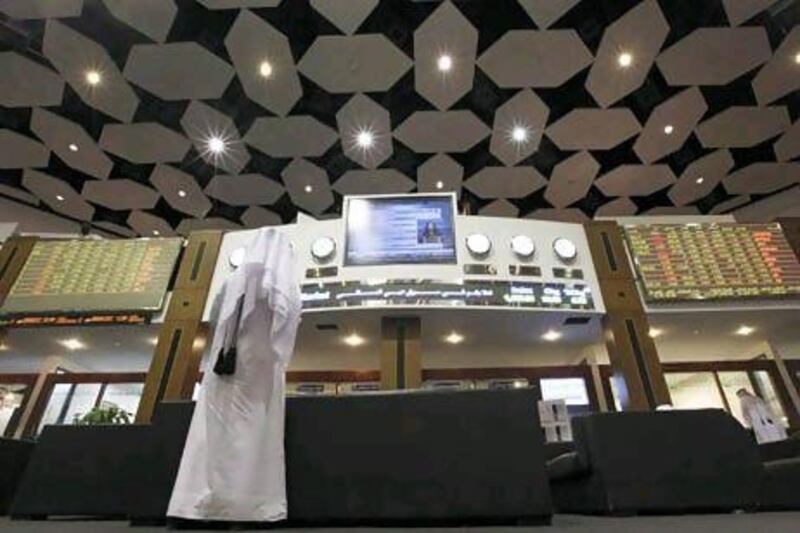Investors have lost that lovin' feeling when it comes to shares.
Hopes for a recovery have dissipated, wiping out half of the gains made in January and February, and analysts are not yet seeing a bottom.
Regional stock markets are likely to remain subdued this week, with smart money sitting on the sidelines, after last week's volatility on global markets as Europe's debt crisis worsened.
A lack of regional catalysts to spur buying has caused regional markets to become strongly correlated to global markets as sentiment remains shaky.
"Regional markets will move … sideways as developments over the European financial crisis and the disagreements among its parties will remain the main driver for global market uncertainty," said Tariq Qaqish, the deputy head of asset management at Al Mal Capital in Dubai.
The UAE is under review for a possible upgrade to "emerging market" status next month. The country is currently classified as a frontier market by MSCI, an international index provider.
MSCI's indexes are tracked by investors with about US$3 trillion in assets. However, traders are not optimistic about the upcoming review and generally expect the country to fail to make the upgrade.
With second-quarter results not due until July into August during the month of Ramadan, when trading activity is generally low, many investors are preparing to fasten their seat belts as volatility triggered by headlines from Europe dictates how the regional markets perform.
"Stock market volumes will decline as we enter the summer season, so unless there is a big news in the region such as an IPO or merger, we expect things to remain subdued," said Sebastien Henin, a portfolio manager at The National Investor in Abu Dhabi.
Dubai's stock market rose 35 per cent from late January to March but has fallen 15.6 per cent since. The Abu Dhabi Securities Exchange (ADX) rose almost 10 per cent, but has declined 6.6 in the same period.
"We are reaching oversold territories and where markets should be due for an upward correction," said Haissam Arabi, the chief executive at the asset-manager Gulfmena Investments in Dubai. "However lack of resolution or catalyst from European countries could delay such a correction and may even kick-start another round of sell-offs."
Last week, UAE stock markets were on a roller-coaster ride, one day up, the next down, on low volumes. The Dubai Financial Market General Index closed 0.1 per cent higher for the week, while the ADX General Index ended the week 0.1 per cent lower at 2,464.68.
"If we see some stabilisation in Europe, if things are not going to get worse, we will at least see some stabilisation in the region," Mr Henin said.
Central banks and companies risk making a grave error if they do not brace for a possible Greek exit from the euro zone, Belgium's foreign minister said on Friday, rattling markets already alarmed by Spain's deteriorating finances. European equities have been on a downward trend since mid-March, when Spain said it was struggling to meet austerity targets and Greece subsequently failed to form a new government after voters rejected austerity measures, raising the prospect of the country leaving the euro zone. Greece, which will hold fresh elections on June 17, is a big weight on sentiment as many fear the country will have to exit the euro zone, a move that could cause major disruption to world financial markets.
Investors are watching the price of oil, which is a big driver for the region, Mr Henin said. Crude contracts for July in New York declined to near US$90 a barrel on Friday, down 15 per cent from $106 a barrel just three weeks ago, amid signs of slower economic growth in Europe and Asia.
Elsewhere in the region, Kuwait's measure fell 1.3 per cent to 6,339.39 over the course of last week, Bahrain's slipped 0.5 per cent to 1,145.39, Oman's MSM 30 Index rose 0.9 per cent to 5,708.37, and Qatar's QE Index was little changed at 8,462.91. Saudi Arabia's Tadawul All-Share Index was down 0.67 per cent to 7,013.91 yesterday.
* with Reuters





